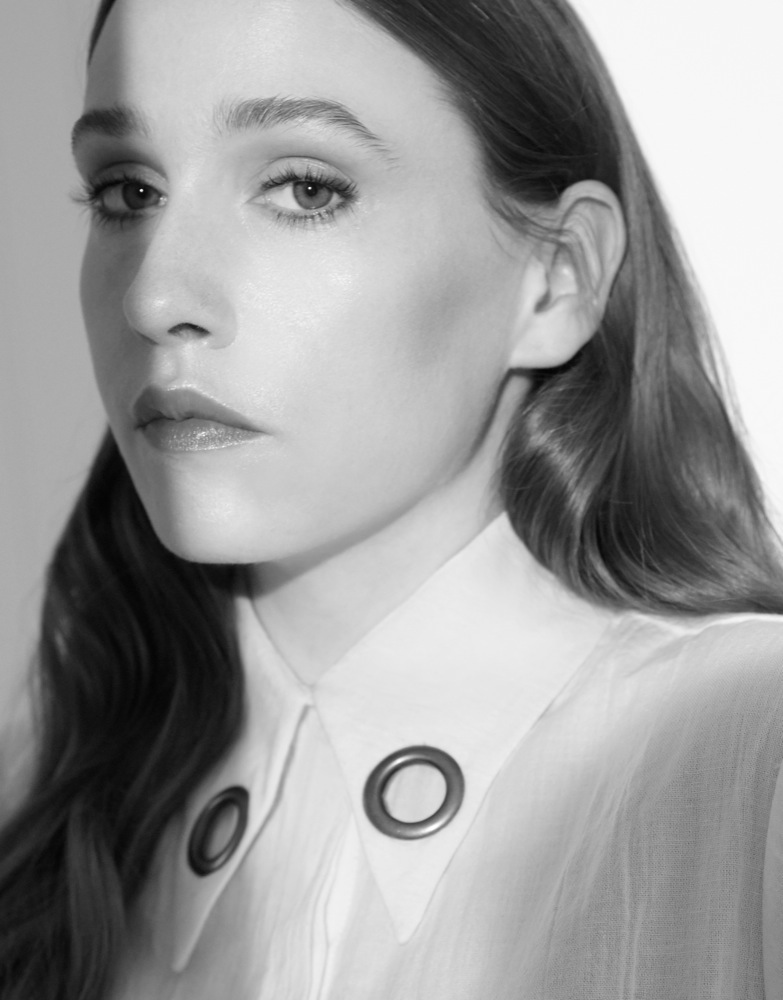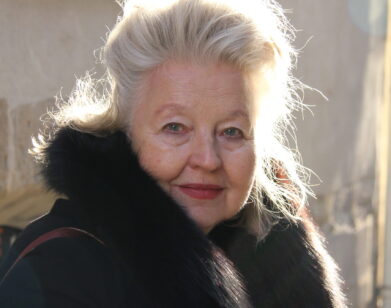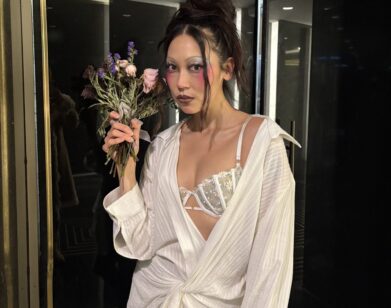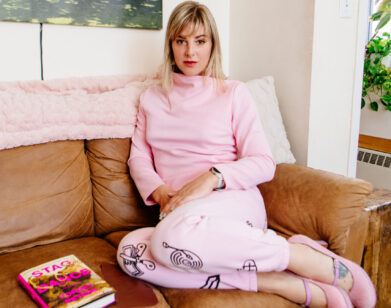The First Daughter
SARAH SUTHERLAND IN LOS ANGELES, JUNE 2016. PHOTOS: MANOLO CAMPION/ART DEPARTMENT. STYLING: TIFFANI CHYNEL/THE WALL GROUP. HAIR: ASHLEY LYNN HALL/ART DEPARTMENT. MAKEUP: SAGE MAITRI/THE WALL GROUP. SET DESIGN: KELLY FONDRY. PHOTO ASSISTANTS: JUSTIN OFFICER, ALEX DE LA HIDAGLA. SPECIAL THANKS: EDGE STUDIOS.
When it comes to family, Veep‘s Catherine Meyer hasn’t had the best of luck. Her beloved Mimaw recently passed away and her father is trying to convince her to invest her inheritance in his new, extremely sketchy-sounding scheme. Her mother, the sitting president Selena Meyer, is no better. When she’s not neglecting Catherine, she’s criticizing her appearance, from her hair and smile to the shape of her skull. This abuse is perhaps not the easiest comedic material to work with, but, thanks to actress Sarah Sutherland’s deadpan sensitivity, Catherine has become one of the funniest characters on the show.
Not everyone agrees with this sentiment; for every opinion piece praising her unadulterated idealism, there is someone who will describe Cather as dour and spineless. “She really divides people,” Sutherland says over the phone. “In the same day, someone will express the utmost empathy for her and confide in me that they have a similar relationship with their mother and feel like they’re being represented by Catherine, and I’ll meet someone who says, ‘Tell her to perk up! Why doesn’t she smile more?'” she continues. “I think people relate to her sensitivity, but at the same time, her privilege and other things about her make her incredibly unrelatable.”
Raised in Los Angeles, Sutherland has an impressive acting lineage: her father is an professional actor, as are both of her paternal grandparents. Before being cast in Veep, she studied theater at NYU’s Tisch School of the Arts. During hiatuses between seasons, she has concentrated on indie movies like Beneath the Harvest Sky (2013) and the forthcoming Chronic.
EMMA BROWN: How did you first get involved in Veep?
SARAH SUTHERLAND: I had signed with my agent out of school a few months prior to [when] Veep started casting. I had the general meeting with [casting director] Allison Jones and she put me on tape for what I think in retrospect was a scene in Girls. We connected immediately. She brought me in for a pre-read for Veep. I was really excited because I was familiar with Armando Iannucci’s work. Then I think my second audition was a chemistry read with Julia [Louis-Dreyfus], and Armando was present as well. It was a really cool experience because, although I formally trained in theater in college, I didn’t have much experience in improv and that audition ended up being totally improv-based. It was liberating. Also working with someone like Julia was so thrilling. It kept me really present and excited. The suggestions that Armando gave me, even as an actor he wasn’t familiar with, were an early insight into how collaborative he was.
BROWN: What are some of the notes he gave you?
SUTHERLAND: It wasn’t so much about the notes themselves. We tried it basically five different ways. One of the takes we did, he told me to go completely off script and find insidious ways to cut Selina down and make her feel bad about herself. I got free rein to say and do terrible things, which of course is very characteristic of other characters in Veep and isn’t something that Catherine really gets to do. To be able to play with those different colors and mix and match things was such a cool experience.
BROWN: The Camp David episode was obviously a big one for Catherine and Selina’s relationship. Can they recover their relationship?
SUTHERLAND: Given their respective dynamic, I think these things happen often. What makes it unusual is that in this particular circumstance, Catherine is very angry, and you don’t often see that in her. I think Selina usually cuts her down or defeats Catherine quite quickly. Without saying or spoiling too much, it’s Catherine who’s going to make any attempt to be less enmeshed with her mother or maybe protect herself more. There’s this sort of interesting resentment that exists there, but then it’s also overridden by this insane reverence and sense of respect and loyalty for her mother that keeps her there and always hoping that things will be different. It’s realy heartbreaking. In a lot of ways Catherine is super mature and sees things really clearly—she’s obviously an intelligent and earnest character—but I think there are a lot of things she can’t really get out from under given her childhood.
BROWN: Her dad is pretty horrible too.
SUTHERLAND: Yeah. In that episode there’s an acknowledgement on Catherine’s part to Selina that she knows that her dad can be sneaky, whereas in earlier seasons he’s the one who comes around and makes her laugh and knows things about her friends. You have a sense that their connection and bond really irritates Selina. I think you’re starting to see the faults of both of them.
BROWN: I know there are a lot of actors in your family, but how did you initially become interested in acting?
SUTHERLAND: I definitely, as a very young person, looking back in retrospect, had the temperament of an actor. I was really wildly sensitive to my surroundings and quiet and observant. I remember having a real reverence and respect for theater, but I didn’t really do it when I was young because a lot of the opportunities that aren’t professional are musical theater. I always thought that was really goofy and insincere and very performative and I had no interest in it. I went to a performing arts school and acting is the track I did. That’s how I arrived at it.
BROWN: When you were growing up, did you go to the theater a lot? Were you ever on film sets?
SUTHERLAND: I actually never went to film sets. I did go see theater. My grandmother [Shirley Douglas] is a really respected and renowned theater actress in Canada. She always took me to see plays. I remember seeing a production of The Glass Menagerie with her and my dad when I was nine years old, and being really affected by it. It was really powerful. To see two people that you know so intimately and actually successfully forget [who they are] is a really moving experience to have at that age.
BROWN: I heard that, while you were at NYU, you wrote and acted in a one-woman show before you left.
SUTHERLAND: I did. I was a part of a program in Tisch called the Experimental Theater Wing, which basically covered a curriculum that subscribes to a different acting technique. We did formal script analysis, we do experimental movement, and there’s a huge emphasis on creating and writing your own work. In my last semester, I had an opportunity to have theater space and put up a play instead of having acting class, so I decided to write a surreal, one-woman piece.
BROWN: Do you ever use those experimental techniques now that you’re in a television and film?
SUTHERLAND: You don’t get to choose the studio you’re placed in. Initially when I was accepted there, I was a little bit resistant and reticent because of the word “experimental.” In all honesty, the way that characters are approached is quite conventional. There are a lot of things that I learned there that I use when I’m approaching auditions or even preparing for a specific part. You find out things that you have the freedom to do that you don’t apply maybe as directly or literally, but that help you access emotions. We did, for example, clowning. In the beginning I was really resistant to it because I thought it seemed a bit goofy. Then what you realize over the process of it is that it’s when people are being insincere and performative that things aren’t funny and they look like idiots. If you can actually tap into the sincere emotion, which usually comes out when you’re failing to make people laugh and you get frustrated or angry, and you have some sort of huge, wild cry or emotional response, that’s when people laugh. I think actually, if anything, that’s where I learned a lot about comedy.
BROWN: Have you done any writing since you left university?
SUTHERLAND: I have. I write quite regularly but I haven’t really been monogamous to one specific idea or project. I’ve been focused on whatever work is in front of me. It is something I really enjoy doing and it’s a part of my identity. With my own stuff I’m pretty private and guarded about it. I had a peer in school that I shared all my work with. We also lived together and we were both writing plays at the same time—our entire floor was just a massive, different rainbow of note cards and pieces of paper everywhere with scribbles on them. My best friend is a writer and he sends me all of his material. I always read it extensively and send him back my notes. He is waiting for me to send something in return. [laughs] In a couple years. My passion and interest in writing, at least for the time being, until I feel like I’ve accomplished more of my goals in acting, is really just for myself.
BROWN: You said that you met with Allison Jones right after you graduated. She cast you in Beneath the Harvest Sky as well.
SUTHERLAND: Yeah. When I first auditioned for Veep, it was just a guest star in one episode in that first season. That part led into me getting Beneath the Harvest Sky because I had that rapport established with Allison. Beneath the Harvest Sky is, to date, one of the most fulfilling work experiences I’ve ever had.
BROWN: What made it so special?
SUTHERLAND: It was really fun to work on a coming-of-age story at that time. It was also a really collaborative process. Because [directors] Aaron [Gaudet] and Gita [Pullapilly] come from a documentary film background, there was so much attention paid to authenticity. They cast four kids who are from major cities, [but] they had us go to Maine early. I actually worked on a farm. We each picked a local kid to shadow and mimic their way of speaking and get the accent. In that part of Northern Maine, the accent is very, very specific. For me, it was really great to be out of context and immerse myself in what the day in, day out life would be. Also, because of the ages of the people in this film, it was almost like this delightful regression to summer camp. All of us bonded really quickly. I felt like I got a chance to relive my teenage years in some kind of alternate universe. They took away our cars; we weren’t able to drive. We were 45 minutes away from any town or grocery store or restaurant, and we were staying in the local Christian retreat center. Our idea of fun was all hanging out together and going to the graveyard, or hanging out in the church, or playing “Never Have I Ever,” and driving around in pickup trucks, or doing a moose safari, which we actually shot. We went out four different times in the middle of the night after a 12-hour shooting day to try to capture an actual moose so that it felt real. That’s definitely an experience I would not have had otherwise.
BROWN: Did they bring you up to Maine so early just so you could bond with one another, or were you working on the film and doing rehearsals?
SUTHERLAND: I literally had just wrapped a film in Los Angeles and I flew out the next day. It was communicated to my representation that it was essential that I was there by this particular date. When we all got there, there were two weeks where we didn’t shoot. They said they were keenly aware that maybe representation wouldn’t be the most supportive of that two-week period of time. It was really important to them. We had that amount of time to get to know each other and immerse ourselves in the surroundings. It’s not that much time, but when there are no distractions outside of just that one thing that you’re doing, a lot of bonding happened really quickly. Beyond being people I hope to work with again, all of the people in the cast and crew of that movie are now near and dear friends.
THE SEASON FIVE FINALE OF VEEP AIRS THIS SUNDAY ON HBO.







